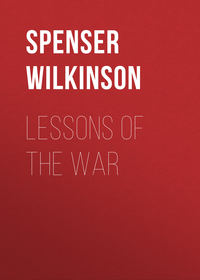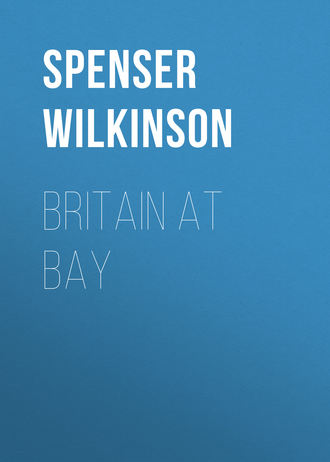 полная версия
полная версияBritain at Bay
The estimate just given is, however, extravagant. The British system has innumerable different rates of pay and extra allowances of all kinds, and is so full of anomalies that it is bound to be costly. Unfortunately, the Army Estimates are so put together that it is difficult to draw from them any exact inferences as to the actual annual cost of a private soldier beyond his pay.
The average annual cost, effective and non-effective, of an officer in the cavalry, artillery, engineers, and infantry is £473, this sum covering all the arrangements for pensions and retiring allowances.
I propose in the following calculations to assume the average cost of an officer to be £500 a year, a sum which would make it possible for the average combatant officer to be somewhat better paid than he is at present.
The normal pay of a sergeant in the infantry of the line is 2s. 4d. a day, or £42, 11s. 8d. a year. The Army Estimates do not give the cost of a private soldier, but the statement is made that the average annual cost per head of 150,000 warrant officers, non-commissioned officers, and men is £63, 6s. 7d. The warrant officers and non-commissioned officers appear to be much more expensive than the private, and as the minimum pay of a private is £18, 5s., the balance, £45, 1s. 7d., is probably much more than the cost of housing, clothing, feeding, and equipping the private, whose food, the most expensive item, certainly does not cost a shilling a day or £18 a year.
I assume that the cost of maintaining a private soldier is covered by £36 a year, while his allowance of 4d. a day amounts to £6, 1s. 4d. In order to cover the extra allowances which may be made to corporals, buglers, and trumpeters, I assume the average cost of the rank and file to be £45 a year. I also assume that the average cost of a sergeant does not exceed £100 a year, which allows from £40 to £50 for his pay and the balance for his housing, clothing, equipment, and food. I add provisions for pensions for sergeants after twenty-five years' service.
These figures lead to the following estimate:—
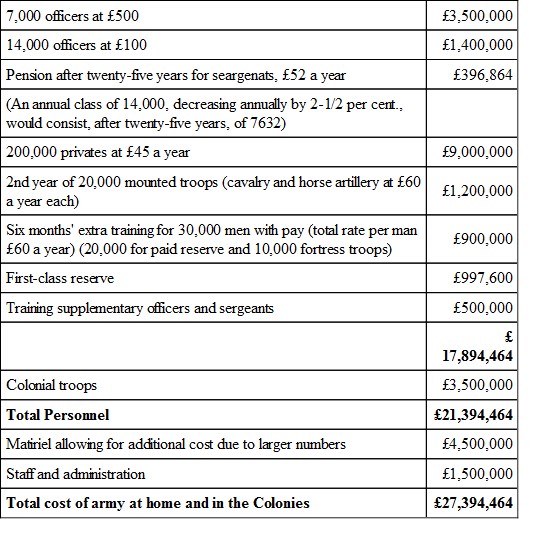
The figures here given will, it is hoped, speak for themselves. They are, if anything, too high rather than too low. The number of officers is calculated on the basis of the present war establishments, which give 5625 officers for 160,500 of the other ranks. It does not include those in Egypt and the Colonies. The cost of the officers is taken at a higher average rate than that of British officers of the combatant arms under the present system, and, both for sergeants and for privates, ample allowance appears to me to be made even on the basis of their present cost.
When it is considered that Germany maintains with the colours a force of 600,000 men at a cost of £29,000,000, that France maintains 550,000 for £27,000,000, and that Italy maintains 221,000 for £7,500,000, it cannot be admitted that Great Britain would be unable to maintain 220,000 officers and men at an annual cost of £17,500,000, and the probability is that with effective administration this cost could be considerably reduced.
It may at first sight seem that the logical course would have been to assume two years' service in the infantry and three years' service in the mounted arms, in accord with the German practice, but there are several reasons that appear to me to make such a proposal unnecessary. In the first place, Great Britain's principal weapon must always be her navy, while Germany's principal weapon will always be her army, which guarantees the integrity of her three frontiers and also guards her against invasion from oversea. Germany's navy comes only in the second place in any scheme for a German war, while in any scheme for a British war the navy must come in the first place and the army in the second.
The German practice for many years was to retain the bulk of the men for three years with the colours. It was believed by the older generation of soldiers that any reduction of this period would compromise that cohesion of the troops which is the characteristic mark of a disciplined army. But the views of the younger men prevailed and the period has been reduced by a third. The reduction of time has, however, placed a heavier responsibility upon the body of professional instructors.
The actual practice of the British army proves that a recruit can be fully trained and be made fit in every way to take his place in his company by a six months' training, but in my opinion that is not sufficient preparation for war. The recruit when thoroughly taught requires a certain amount of experience in field operations or manoeuvres. This he would obtain during the summer immediately following upon the recruit training; for the three months of summer, or of summer and autumn, ought to be devoted almost entirely to field exercises and manoeuvres. If the soldier is then called out for manoeuvres for a fortnight in each of four subsequent years, or for a month in each of two subsequent years, I believe that the lessons he has learned of operations in the field will thereby be refreshed, renewed, and digested, so as to give him sufficient experience and sufficient confidence in himself, in his officers, and in the system to qualify him for war at any moment during the next five or six years. The additional three months' manoeuvre training, beyond the mere recruit training, appears to me indispensable for an army that is to be able to take the field with effect. But that this period should suffice, and that the whole training should be given in nine or ten months of one year, followed by annual periods of manoeuvre, involves the employment of the best methods by a body of officers steeped in the spirit of modern tactics and inspired by a general staff of the first order.
The question what is the shortest period that will suffice to produce cohesion belongs to educational psychology. How long does it take to form habits? How many repetitions of a lesson will bring a man into the condition in which he responds automatically to certain calls upon him, as does a swimmer dropped into the water, a reporter in forming his shorthand words, or a cyclist guiding and balancing his machine? In each case two processes are necessary. There is first the series of progressive lessons in which the movements are learned and mastered until the pupil can begin practice. Then follows a period of practice more or less prolonged, without which the lessons learned do not become part of the man's nature; he retains the uncertainty of a beginner. The recruit course of the British army is of four months. A first practice period of six months followed by fresh practice periods of a month each in two subsequent years or by four practice periods of a fortnight each in four successive years are in the proposals here sketched assumed to be sufficient. If they were proved inadequate I believe the right plan of supplementing them would be rather by adding to the number and duration of the manoeuvre practices of the subsequent years than by prolonging the first period of continuous training.
The following table shows the cost of two years' service calculated on the same bases as have been assumed above. Two years' service would mean an army with the colours not of 200,000 but of 390,000 men. This would require double the number of officers and sergeants, and the annual estimates for personnel would be £34,000,000, and the total Army Estimates £41,000,000. There would also be a very great extra expenditure upon barracks.
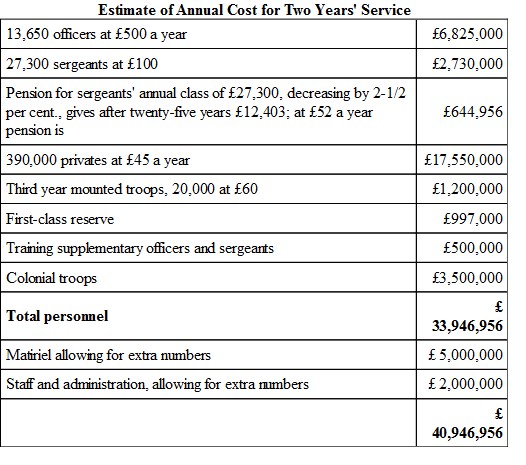
XIX
ONE ARMY NOT TWO
The training provided in the scheme which I have outlined could be facilitated at comparatively small cost by the adoption of certain preparatory instruction to be given partly in the schools, and partly to young men between the ages of seventeen and twenty.
It has never appeared to me desirable to add to the school curriculum any military subjects whatever, and I am convinced that no greater mistake could be made, seeing that schoolmasters are universally agreed that the curriculum is already overloaded and requires to be lightened, and that the best preparation that the school can give for making a boy likely to be a good soldier when grown up, is to develop his intelligence and physique as far as the conditions of school life admit. But if all school children were drilled in the evolutions of infantry in close order, the evolutions being always precisely the same as those practised in the army, the army would receive its men already drilled, and would not need to spend much time in recapitulating these practices, which make no appreciable demand upon the time of school children.
Again, there seems to be no doubt that boys between the ages of seventeen and twenty can very well be taught to handle a rifle, and the time required for such instruction and practice is so small that it would in no way affect or interfere with the ordinary occupations of the boys, whatever their class in life.
Every school of every grade ought, as a part of its ordinary geography lessons, to teach the pupils to understand, to read, and to use the ordnance maps of Great Britain, and that this should be the case has already been recognised by the Board of Education. A soldier who can read such a map has thereby acquired a knowledge and a habit which are of the greatest value to him, both in manoeuvres and in the field.
The best physical preparation which the schools can give their pupils for the military life, as well as for any other life, is a well-directed course of gymnastics and the habits of activity, order, initiative, and discipline derived from the practice of the national games.
A national army is a school in which the young men of a nation are educated by a body of specially trained teachers, the officers. The education given for war consists in a special training of the will and of the intelligence. In order that it should be effective, the teachers or trainers must not merely be masters of the theory and practice of war and of its operations, but also proficient in the art of education. This conception of the officers' function fixes their true place in the State. Their duties require for their proper performance the best heads as well as the best-schooled wills that can be found, and impose upon them a laborious life. There can be no good teacher who is not also a student, and a national army requires from its officers a high standard not only of character, but of intelligence and knowledge. It should offer a career to the best talent. A national army must therefore attract the picked men of the universities to become officers. The attraction, to such men consists, chiefly, in their faith in the value of the work to be done, and, to a less degree, in the prospect of an assured living. Adequate, though not necessarily high, pay must be given, and there must be a probability of advancement in the career proportionate to the devotion and talents given to the work. But their work must be relied upon by the nation, otherwise they cannot throw their energies into it with full conviction.
This is the reason why, if there is to be a national army, it must be the only regular army and the nation must rely upon nothing else. To keep a voluntary paid standing army side by side with a national army raised upon the principle of universal duty is neither morally nor economically sound. Either the nation will rely upon its school or it will not. If the school is good enough to serve the nation's turn, a second school on a different basis is needless; if a second school were required, that would mean that the first could not be trusted.
There can be no doubt that in a national school of war the professional officers must be the instructors, otherwise the nation will not rely upon the young men trained. The 200,000 passed through the school every year will be the nation's best. Therefore, so soon as the system has been at work long enough to produce a force as large as the present total, that is, after the third year, there will be no need to keep up the establishment of 138,000 paid privates, the special reserve, or the now existing territorial force. There will be one homogeneous army, of which a small annual contingent will, after each year's training, be enlisted for paid service in India, Egypt, and the oversea stations, and a second small contingent, with extra training, will pass into the paid reserve for service in small oversea expeditions.
The professional officers and sergeants will, of course, be interchangeable between the national army at home and its professional branches in India, Egypt, and the oversea stations, and the cadres of the battalions, batteries, and squadrons stationed outside the United Kingdom can from time to time be relieved by the cadres of the battalions' from the training army at home. This relief of battalions is made practicable by the national system. One of the first consequences of the new mode of recruiting will be that all recruits will be taken on the same given date, probably the 1st of January in each year, and, as this will apply as well to the men who re-engage to serve abroad as to all others, so soon as the system is in full working order, the men of any battalion abroad will belong to annual classes, and the engagement of each class will terminate on the same day.
XX
THE TRANSITION
I have now explained the nature and working of a national army, and shown the kind of strength it will give and the probable maximum cost which it will involve when adopted.
The chief difficulty attendant upon its adoption lies in the period of transition from the old order to the new. If Great Britain is to keep her place and do her duty in the world the change must be made; but the question arises, how is the gulf between one and the other to be bridged? War comes like a thief in the night, and it must not catch this country unready.
The complete readiness which the new system, when in full swing, will produce, cannot be obtained immediately. All that can be done in the transition period is to see that the number and quality of men available for mobilisation shall be at least as high as it is under the existing system. It may be worth while to explain how this result can be secured.
Let us assume that the Act authorising the new system is passed during a year, which may be called '00, and that it is to come into force on the 1st January of the year '01. The Act would probably exempt from its operations the men at the date of its passing already serving in any of the existing forces, including the territorial army, and the discussion on the Bill would, no doubt, have the effect of filling the territorial army up to the limit of its establishment, 315,000 men.
On the 31st December '00 the available troops would therefore be:—
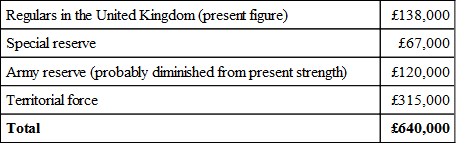
From the 1st January '01 recruiting on present conditions for all these forces would cease.
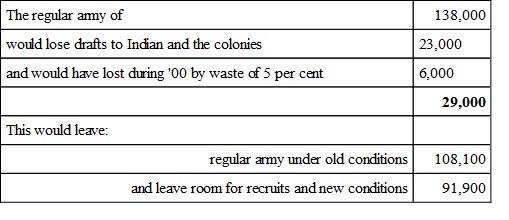
The total available for mobilisation during the year '01 would therefore be:—
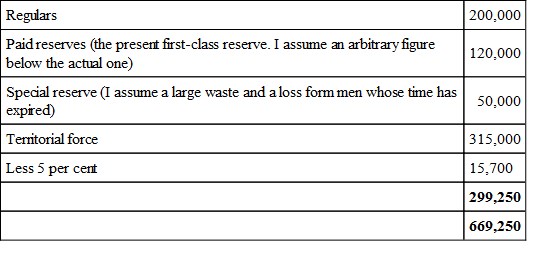
On the 1st January '02 the regular army would be:—
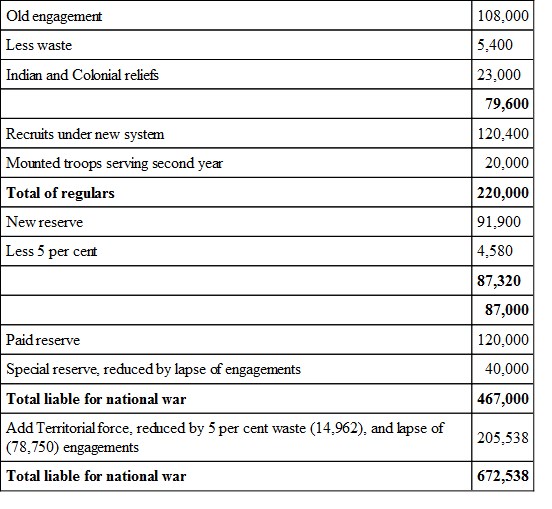
In the year '03 there would be:—
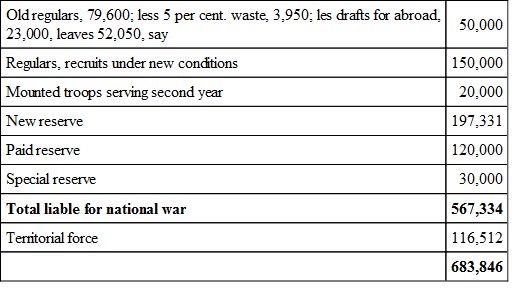
In the year '04 there would be:—
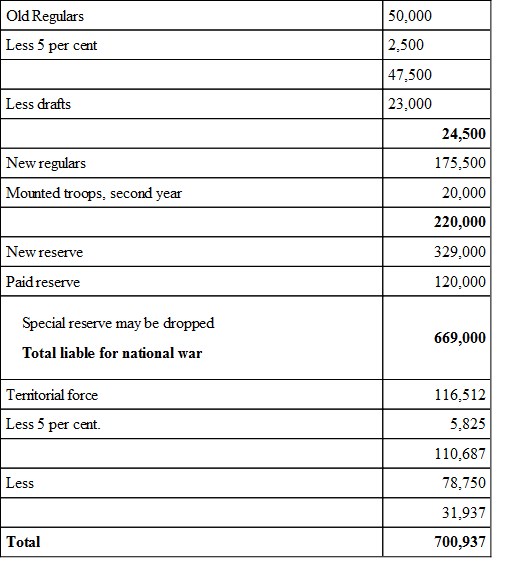
At the end of '04 the territorial force would come to an end and in '05 there would be:—
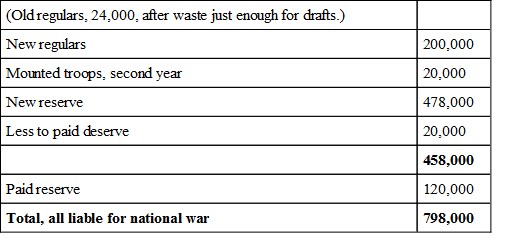
In these tables I have taken the drafts for India and the Colonies from the old regulars. But they can just as well be taken from the new regulars. If need be the old regulars could, before the fourth year, be passed into the paid reserve, and the full contingent of 200,000 one year's men taken.
The men of the special reserve and territorial force would on the termination of their engagements pass into the second line reserve or Landwehr until the age of thirty-one or thirty-two.
It will be seen that during the years of transition additional expense must be incurred, as, until the change has been completed, some portion of the existing forces must be maintained side by side with the new national army. It is partly in order to facilitate the operations of the transition period that I have assumed a large addition to the number of officers. There will also be additional expense caused by the increase of barrack accommodation needed when the establishment is raised from 138,000 privates to 200,000, but this additional accommodation will not be so great as it might at first sight appear, because it is reasonable to suppose that those young men who wish it, and whose parents wish it, will be allowed to live at home instead of in barracks, provided they regularly attend all drills, parades, and classes.
It has been necessary, in discussing the British military system, to consider the arrangements for providing the garrisons of India, Egypt, and certain oversea stations during peace, and to make provision for small wars or imperial police; but I may point out that the system by which provision is made out of the resources of the United Kingdom alone for these two military requirements of the Empire, is, in the present conditions of the Empire, an anomaly. The new nations which have grown up in Canada, Australia, and New Zealand are anxious, above all things, to give reality to the bond between them and the mother country. Their desire is to render imperial service, and the proper way of giving them the opportunity to do so is to call upon them to take their part in maintaining the garrisons in India and Egypt and in the work of imperial police. How they should do it, it is for them to decide and arrange, but for Englishmen at home to doubt for a moment either their will or their capacity to take their proper share of the burden is to show an unworthy doubt of the sincerity of the daughter nations and of their attachment to the mother country and the Empire.
If Great Britain should be compelled to enter upon a struggle for existence with one of the great European powers, the part which Canada, Australia, New Zealand, and South Africa could play in that struggle is limited and specific. For the conflict would, in the first instance, take the form of a naval war. To this the King's dominions beyond the seas can do little more than assist during peace by their contributions, either of ships, men, or money, in strengthening the British navy. But during the actual course of such a war, while it is doubtful whether either Canada, Australia, or New Zealand could render much material help in a European struggle, they could undoubtedly greatly contribute to the security of India and Egypt by the despatch of contingents of their own troops to reinforce the British garrisons maintained in those countries. This appears to me to be the direction to which their attention should turn, not only because it is the most effective way in which they can promote the stability of the Empire, but also because it is the way along which they will most speedily reach a full appreciation of the nature of the Empire and its purpose in the world.
XXI
THE PRINCIPLES ON WHICH ARMIES ARE RAISED
I have now sketched the outlines of a national military system applicable to the case of Great Britain. It remains to show why such a system is necessary.
There are three main points in respect of each of which a choice has to be made. They are the motive which induces men to become soldiers, the time devoted to military education, and the nature of the liability to serve in war. The distinction which strikes the popular imagination is that between voluntary and compulsory service. But it covers another distinction hardly less important—that between paid and unpaid soldiers. The volunteers between 1860 and 1878, or 1880, when pay began to be introduced for attendance in camps, gave their time and their attention with no external inducement whatever. They had no pay of any kind, and there was no constraint to induce them to join, or, having, joined, to continue in their corps. The regular soldier, on the other hand, makes a contract with the State. He agrees in return for his pay, clothes, board and lodging to give his whole time for a specific number of years to the soldier's life.
The principle of a contract for pay is necessary in the case of a professional force maintained abroad for purposes of imperial police; but it is not possible on that principle to raise or maintain a national army.
The principle of voluntary unpaid service appears to have a deeper moral foundation than that of service by a contract of hiring. But if the time required is greater than is consistent with the men's giving a full day's work to their industrial occupations the unpaid nature of the service cannot be maintained, and the men must be paid for their time. The merit of the man's free gift of himself is thereby obscured.
Wherein does that merit consist? If there is no merit in a man's making himself a soldier without other reward than that which consists in the education he receives, then the voluntary system has no special value. But if there is a merit, it must consist in the man's conferring a benefit upon, or rendering a service to, his country. In other words, the excellence of the unpaid voluntary system consists in its being an acceptance by those who serve under it of a duty towards the State. The performance of that duty raises their citizenship to a higher plane. If that is the case it must be desirable, in the interest both of the State and of its citizens, that every citizen capable of the duty should perform it. But that is the principle upon which the national system is based. The national system is therefore an extension of the spirit of the volunteer or unpaid voluntary system.
The terms compulsory service and universal service are neither of them strictly accurate. There is no means of making every adult male, without exception, a soldier, because not every boy that grows up has the necessary physical qualification. Nor does the word compulsion give a true picture. It suggests that, as a rule, men would not accept the duty if they could evade it, which is not the case. The number of men who have been volunteers since 1860 shows that the duty is widely accepted. Indeed, in a country of which the government is democratic, a duty cannot be imposed by law upon all citizens except with the concurrence of the majority. But a duty recognised by the majority and prescribed by law will commend itself as necessary and right to all but a very few. If a popular vote were to be taken on the question whether or not it is every citizen's duty to be trained as a soldier and to fight in case of a national war, it is hardly conceivable that the principle would fail to be affirmed by an overwhelming majority.
The points as to which opinions are divided are the time and method of training and the nature of the liability to serve in war.
There are, roughly speaking, three schemes of training to be considered—first, the old volunteer plan of weekly evening drills, with an annual camp training; secondly, the militia plan of three months' recruit training followed by a month's camp training in several subsequent years; and, lastly, the continental plan of a continuous training for one or more years followed by one or more periods of annual manoeuvres. The choice between these three methods is the crucial point of the whole discussion. It must be determined by the standard of excellence rendered necessary by the needs of the State. The evidence given to the Norfolk Commission convinced that body that neither the first nor the second plan will produce troops fit to meet on equal terms those of a good modern army. Professional officers are practically unanimous in preferring the third method.
The liability of the trained citizen to serve in war during his year in the ranks and his years as a first-class reservist must be determined by the military needs of the country. I have given the reasons why I believe the need to be for an army that can strike a blow in a continental war.


